A tax-friendly state for retirees refers to a state with a low overall tax burden on retirees, including lower income, property, sales, and estate taxes. These states offer attractive tax benefits that can help seniors maximize their retirement savings and maintain their quality of life. Considering tax implications for retirement planning is crucial, as taxes can significantly impact a retiree's finances. By understanding and minimizing their tax burden, retirees can stretch their retirement savings further, ensuring financial stability and comfort in their golden years. Various factors affect tax burdens on retirees, including state income tax rates, property and sales tax rates, and the availability of tax breaks and exemptions for seniors. Evaluating these factors helps retirees make informed decisions about where to live during their retirement years.
The following states are considered to be tax-friendly for retirees: Florida: It has no state income tax, and there is no inheritance tax or estate tax. The property taxes are also lower compared to other states. Nevada: It does not have state income tax, and the state also has no inheritance or estate tax. Property taxes are relatively low. Wyoming: It does not have state income tax, and there is no inheritance or estate tax. Property taxes are also low. South Dakota: It does not have state income tax, and there is no inheritance or estate tax. Property taxes are relatively low. Texas: It does not have state income tax, and there is no inheritance or estate tax. Property taxes are relatively low. Mississippi: It has a low cost of living and low property taxes. There is also no estate or inheritance tax. Tennessee: It does not have state income tax, and the state has no inheritance tax. Property taxes are low. Alabama: It has a low cost of living and low property taxes. There is also no estate or inheritance tax. Delaware: It does not have state sales tax, and there is no inheritance or estate tax. Property taxes are also low. Utah: It does have state income tax, but it is low, and the state has no inheritance or estate tax. Property taxes are also relatively low. It's worth noting that while these states may be tax-friendly for retirees, they may not be the best choice for everyone. Factors such as climate, healthcare, and proximity to family and friends may also play a role in choosing a retirement destination. In some states, Social Security benefits are subject to state income taxes, increasing the tax burden on retirees. However, many tax-friendly states either exempt Social Security income from taxation or do not have a state income tax, making them attractive options for retirees. The taxation of pension and retirement account withdrawals varies by state. Some tax-friendly states exclude these sources of income from taxation or offer partial exemptions, while others tax them at standard income tax rates. Retirees should consider these differences when choosing a retirement destination. Property tax rates can significantly impact retirees, especially those on fixed incomes. Tax-friendly states generally have lower property tax rates or offer property tax relief programs, ensuring that retirees can afford to maintain their homes without undue financial strain. Many states offer property tax relief programs for seniors, such as homestead exemptions, deferrals, or freezes. These programs can help retirees reduce their property tax burden and make it easier for them to maintain their homes during retirement. State sales tax rates can also impact retirees' overall tax burden. Some tax-friendly states have low or no sales tax, which can help retirees save money on everyday expenses and maintain their desired standard of living. Some states offer sales tax exemptions or discounts for seniors on specific items or services, such as prescription medications or utility services. These exemptions can help retirees save money and stretch their retirement savings further. Estate and inheritance taxes can impact the wealth retirees can pass on to their heirs. Tax-friendly states often have no or low estate and inheritance taxes, making them more appealing for retirees looking to preserve their wealth for future generations. To evaluate a state's tax-friendliness for retirees, it is essential to consider the overall tax burden, including income, property, sales, and estate taxes. This comprehensive assessment helps retirees determine which states will best align with their financial goals and desired lifestyle. Comparing the cost of living across states is another crucial factor in determining tax-friendliness. A state with lower taxes but a high cost of living may not be the best option for retirees, while a state with higher taxes but a lower cost of living may still offer significant savings. Assessing available tax breaks and incentives for seniors, such as homestead exemptions and senior discounts, can help retirees identify states that offer the most significant potential savings. These tax breaks can substantially reduce the overall tax burden and improve retirees' financial well-being. Quality of life and available amenities, such as healthcare facilities, recreational opportunities, and community resources, should also be considered when evaluating a state's tax-friendliness for retirees. A tax-friendly state with poor amenities may not be the best choice for a fulfilling retirement. One effective strategy for maximizing tax savings during retirement is relocating to a tax-friendly state. This can significantly reduce the overall tax burden, helping retirees stretch their retirement savings and maintain their desired lifestyle. Diversifying income sources can also help retirees minimize their tax burden. By generating income from various sources, such as investments, rental properties, and part-time work, retirees can take advantage of different tax rates and exemptions, further reducing their tax liability. Utilizing tax-advantaged accounts, such as IRAs and 401(k)s, can help retirees save on taxes during their retirement years. These accounts offer tax-deferred or tax-free growth, allowing retirees to accumulate wealth more efficiently and minimize their tax liability upon withdrawal. Engaging in proper estate planning can help retirees minimize estate and inheritance taxes, ensuring that they can pass on their wealth to future generations with minimal tax consequences. Consulting with a financial planner or estate planning attorney can help retirees develop a tax-efficient estate plan. Tax-friendly states for retirees have a lower overall tax burden, meaning retirees get to keep more of their retirement savings. This can help seniors to maintain their lifestyle and enjoy retirement without financial strain. Lower taxes also make it easier to afford things like healthcare, entertainment, and travel. Many tax-friendly states offer exemptions or partial exemptions for Social Security benefits, pension, and retirement account withdrawals. This can significantly reduce the tax liability for retirees and help them save money during retirement. By keeping more of their retirement savings, seniors can have a more comfortable lifestyle. Property taxes can be a significant expense for retirees, especially those on fixed incomes. Tax-friendly states often have lower property tax rates or offer property tax relief programs for seniors. This can help retirees to maintain their homes and enjoy a comfortable retirement without undue financial strain. Sales tax can also impact retirees' overall tax burden. Some tax-friendly states have low or no sales tax, which can help seniors save money on everyday expenses. This can help them maintain their desired standard of living without putting too much pressure on their retirement savings. Estate and inheritance taxes can impact the wealth retirees can pass on to their heirs. Tax-friendly states often have no or low estate and inheritance taxes, making them more appealing for retirees looking to preserve their wealth for future generations. This can give retirees peace of mind knowing that their assets will be passed on to their loved ones without being heavily taxed. Moving to a tax-friendly state may have implications for family and social connections, as retirees may need to leave behind friends, family, and established support networks. It is essential to weigh the financial benefits against the potential emotional costs of relocation. While tax-friendly states may offer significant tax savings, they may also have hidden costs and lower quality services, such as underfunded schools, healthcare facilities, and infrastructure. Retirees should carefully consider these factors when deciding whether to relocate. Relocating to a tax-friendly state may require retirees to adapt to a new environment and culture, which can be challenging, especially for older adults. It is essential to consider personal preferences and the ability to adapt when evaluating potential retirement destinations. A tax-friendly state for retirees has a low tax burden on retirees including income, property, sales, and estate taxes, offering benefits to maximize retirement savings and maintain a good quality of life. Considering tax implications for retirement planning is crucial for ensuring financial stability and maximizing retirement savings. By understanding and minimizing their tax burden, retirees can enjoy a higher quality of life and make the most of their golden years. It is essential for retirees to evaluate tax-friendly states based on their personal financial goals and lifestyle preferences. This comprehensive approach will help them identify the best retirement destination that aligns with their financial needs and desired quality of life. To optimize their retirement planning and make well-informed decisions, retirees should consider seeking the help of professional retirement planning services.What Are Tax-Friendly States for Retirees?
Top Tax-Friendly States for Retirees
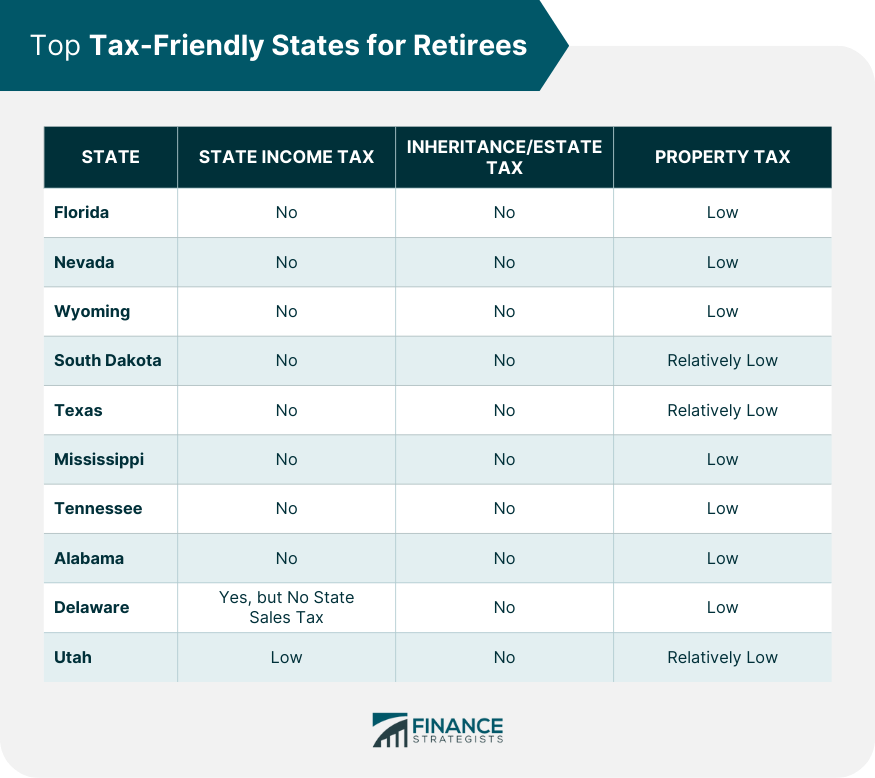
Types of Taxes Affecting Retirees
Income Tax
Social Security Benefits Taxation
Pension and Retirement Account Withdrawals Taxation
Property Tax
Property Tax Rates
Property Tax Relief Programs for Seniors
Sales Tax
State Sales Tax Rates
Exemptions and Discounts for Seniors
Estate and Inheritance Tax
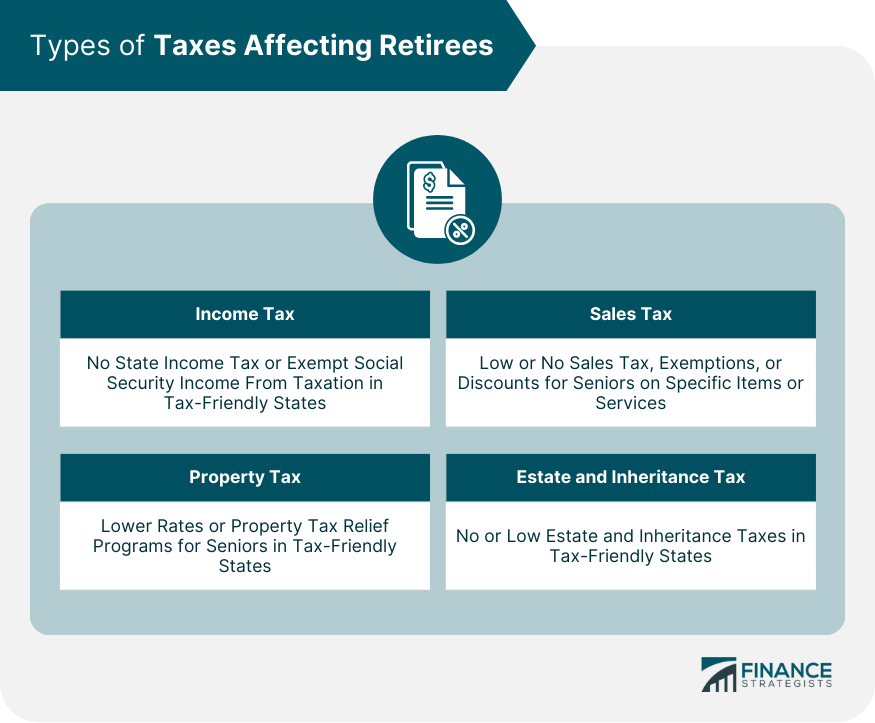
Evaluating a State's Tax-Friendliness for Retirees
Understanding the Overall Tax Burden
Comparing Cost of Living Across States
Analyzing Tax Breaks and Incentives for Seniors
Assessing Quality of Life and Available Amenities
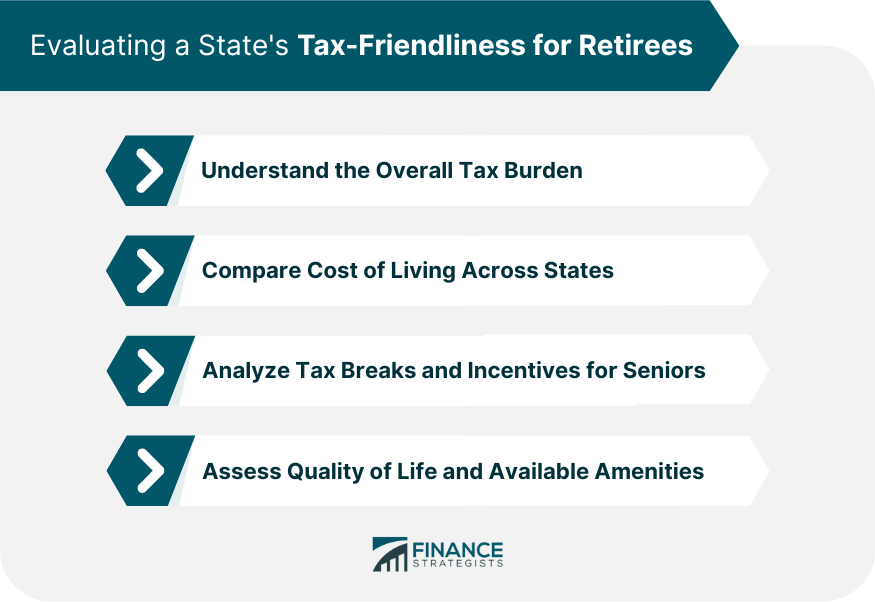
Strategies for Maximizing Tax Savings During Retirement
Relocating to a Tax-Friendly State
Diversifying Income Sources
Utilizing Tax-Advantaged Accounts
Proper Estate Planning
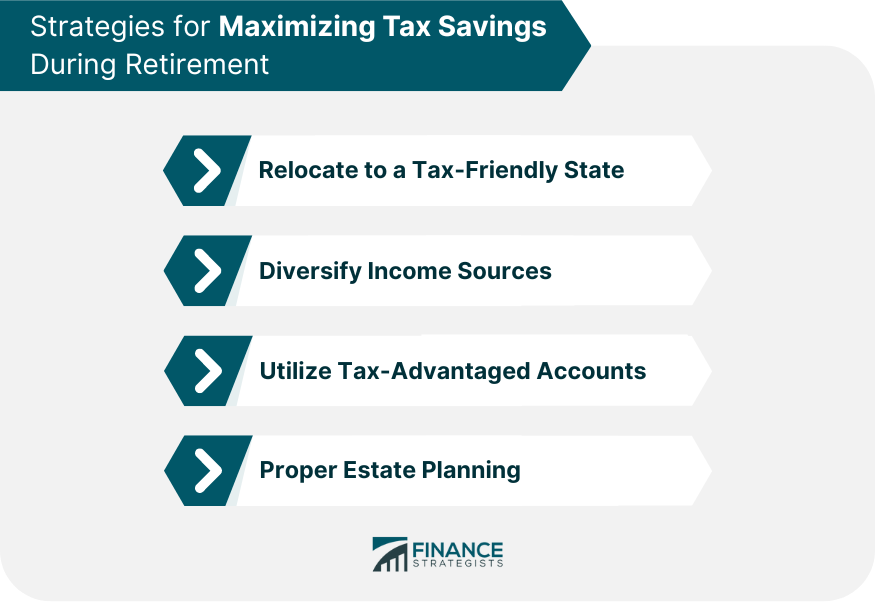
Benefits of Moving to a Tax-Friendly State
Lower Overall Tax Burden
Exemptions for Retirement Income
Lower Property Tax Rates or Relief Programs
Low or No Sales Tax
No or Low Estate and Inheritance Taxes
Potential Drawbacks of Moving to a Tax-Friendly State
Impact on Family and Social Connections
Potential Hidden Costs and Lower Quality Services
Adapting to a New Environment and Culture
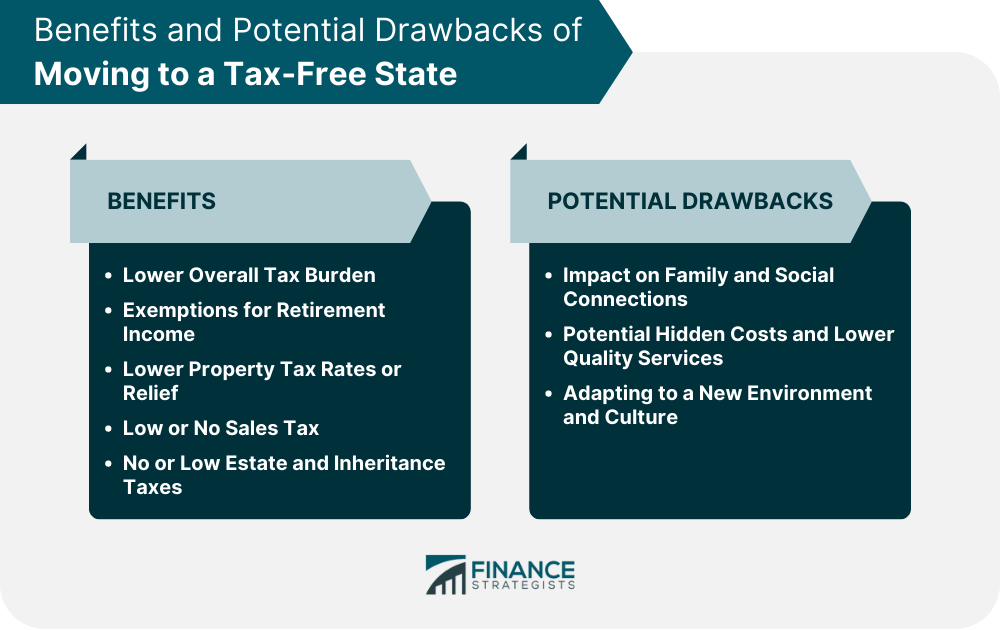
Final Thoughts
Tax-Friendly States for Retirees FAQs
When evaluating tax-friendly states for retirees, consider factors such as overall tax burden, cost of living, available tax breaks and incentives for seniors, and the quality of life and available amenities in each state.
Relocating to tax-friendly states for retirees can help maximize retirement savings by reducing the overall tax burden, including income, property, sales, and estate taxes, allowing retirees to stretch their savings and maintain their desired lifestyle.
When researching tax-friendly states for retirees, consider income tax (including Social Security benefits and pension taxation), property tax (including property tax relief programs for seniors), sales tax (including exemptions and discounts for seniors), and estate and inheritance taxes.
Potential drawbacks of moving to tax-friendly states for retirees may include the impact on family and social connections, potential hidden costs and lower quality services, and adapting to a new environment and culture.
Professional retirement planning services can help retirees navigate tax-friendly states by providing valuable insights and guidance on tax implications, financial planning, and estate planning, ensuring a smooth transition to a financially secure and fulfilling retirement.
True Tamplin is a published author, public speaker, CEO of UpDigital, and founder of Finance Strategists.
True is a Certified Educator in Personal Finance (CEPF®), author of The Handy Financial Ratios Guide, a member of the Society for Advancing Business Editing and Writing, contributes to his financial education site, Finance Strategists, and has spoken to various financial communities such as the CFA Institute, as well as university students like his Alma mater, Biola University, where he received a bachelor of science in business and data analytics.
To learn more about True, visit his personal website or view his author profiles on Amazon, Nasdaq and Forbes.











